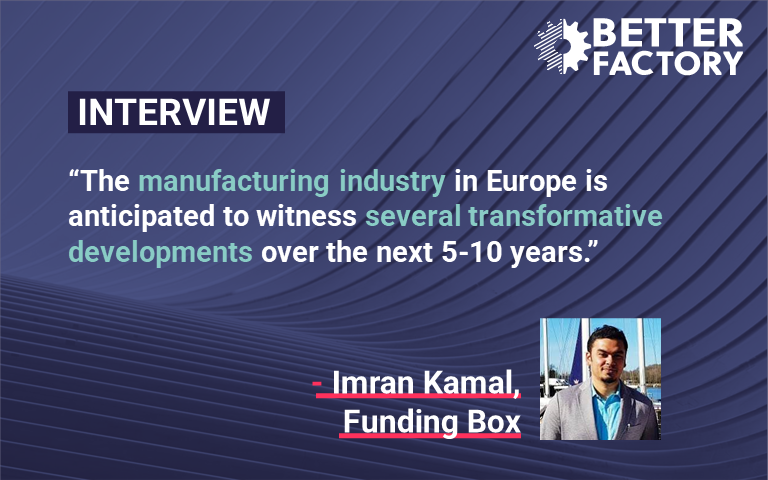
Welcome to our interview series with the partners running Better Factory. Today we are lucky to be joined by one of our all-star team, Imran Kamal, from FundingBox. Today in this interview we will learn more about this organisation and their role in the project!
Thank you for joining us today! Please could you give us a short introduction to FundingBox in your own words, and what is your role here?
FundingBox Accelerator (FBA) is a Polish non‐profit private entity supporting, promoting and launching technological & innovative scaleups (startups and tech SMEs) initiatives in Europe.
We are leading distributors of European public funds in the uptake or development of digital innovation. We are a trusted player for the tech ecosystem and thus we are an orchestrator of public and private partnerships and communities and bring them to the entrepreneurial challenges of tech startups, SMEs, experts, institutions and investors. Our purpose is to champion those actors that want to make an impact in the technological and innovation sphere.
Today, FBA is the European Leader in managing Financial Support to Third Parties, having distributed up to €89 million by participating in 20 projects including FSTP since 2014. FBA is the coordinator of 10 of them and 2 of them have already been finalized with ‘Excellent Progress’ by the European Commission.
Within Better Factory, FBA is the core partner leading Work Package 3 for Open Calls and Matchmaking, and responsible of managing the Financial Support to Third Parties (WP3). Additionally, FBA leads Task 6.2 for the Dissemination of Open Calls.
Thank you! To someone reading this who has never heard of Better Factory before, how would you describe it in simple terms, and why do you feel it is significant?
Better Factory is a European-funded project that aims to help small and medium-sized companies become Industry 4.0 with the help of technology providers to improve their products or create new ones with the contribution of an artist.
For this, two open calls have been published with the intention of bringing together businesses, technology providers, and artists to collaborate on the objectives they have set for themselves. The collaboration between the company and the artist will lead to new products or improve existing ones by adding value to them, which may include improvements in manufacturing, logistics or monitoring.
"The manufacturing industry in Europe is anticipated to witness several transformative developments over the next 5-10 years... such as advanced automation, smart factories empowered by Industrial IoT, additive manufacturing technologies, sustainable practices, customization and personalization, resilient supply chains, workforce development, and regulatory adjustments."
FundingBox is leading the work package of ‘Open calls and matchmaking’ in the project, whereby proposals for the open call will be submitted through the FundingBox Platform. Could you tell us how this process was for the first open call?
Our evaluation process is transparent, fair and equal to all our participants. For the last call, we were looking for the best fit for our project. We expected a high number of applications and since we were much more concerned with quality than quantity, it was more important to put effort into how applicants presented their projects (provide as many details as possible, identifying the main key points and how they fitted with the overall Better Factory scope). This provided the team with a better understanding of the application during the evaluation process.
The evaluation of the proposals follows the following steps:
- Proposals submission
- Eligibility checks: Proposals which do not comply with the ‘eligibility criteria’ will be excluded from shortlisting at ‘Eligible Applicants List’.
- Internal/External evaluation: individual evaluations of submitted proposals, resulting in the ‘Ranking List’
- Consensus meeting: The ‘Selection Committee’ will check the proposals with the best score in the previous phase.
- Jury Day: to which finalists will be invited to present their projects.
After the Jury Day, once formal checks and validations were successfully completed, each selected consortium signed a Sub-Grant Agreement.
What are your predictions for the manufacturing field over the next 5-10 years in Europe?
The manufacturing industry in Europe is anticipated to witness several transformative developments over the next 5-10 years. These changes may encompass advanced automation, smart factories empowered by the Industrial Internet of Things, additive manufacturing technologies, sustainable practices, customization and personalization, resilient supply chains, workforce development, and regulatory adjustments. While these projections highlight potential trends, the ultimate trajectory of the manufacturing field will depend on a multitude of factors, including technological advancements, economic conditions, geopolitical dynamics, and societal shifts.
If you’d like to learn more about our partners or KTEs, just head back to the Insights section to read more interviews!

